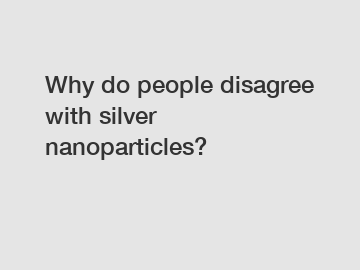Why do people disagree with silver nanoparticles?
Silver nanoparticles have gained popularity in recent years for their impressive antibacterial and antimicrobial properties. These tiny particles have been used in a variety of products, from antibacterial clothing to wound dressings to even household items like socks and water filters. However, despite their widespread use, there are still many people who disagree with the use of silver nanoparticles. In this blog post, we'll explore some of the reasons why people may be skeptical of silver nanoparticles and discuss whether their concerns are valid.
One of the main reasons why people may be hesitant to embrace silver nanoparticles is the potential for environmental harm. As these nanoparticles are released into the environment through various products, there is concern about their impact on ecosystems and wildlife. Some studies have shown that silver nanoparticles can accumulate in the soil and water, leading to harmful effects on aquatic organisms and plants. Additionally, there is also concern about the potential for these nanoparticles to enter the food chain and ultimately harm human health.
Another reason why people may be skeptical of silver nanoparticles is the uncertainty surrounding their long-term health effects. While these particles have been shown to effectively kill bacteria and pathogens, there is still a lack of understanding about how they may interact with human cells. Some studies have suggested that silver nanoparticles could potentially have toxic effects on human cells, leading to concerns about their safety in consumer products. Without more research on the long-term health effects of silver nanoparticles, it is understandable why some people may be hesitant to fully embrace their use.

In addition to concerns about environmental harm and potential health effects, some people may also disagree with the use of silver nanoparticles due to ethical reasons. The use of nanoparticles in consumer products raises questions about sustainability and resource use, as well as the potential for exploitation of natural resources. There is also concern about the widespread use of silver nanoparticles contributing to the rise of bacterial resistance, similar to antibiotics. This could have serious implications for public health, as antibiotic-resistant bacteria are becoming an increasingly concerning issue.
Despite these valid concerns, it is important to note that silver nanoparticles have been extensively studied and shown to be effective in killing bacteria and pathogens. In many cases, the benefits of using silver nanoparticles in consumer products may outweigh the potential risks, especially in applications where traditional antibacterial agents may not be as effective. Additionally, researchers continue to study the potential health and environmental impacts of silver nanoparticles in order to better understand their effects and ensure their safe use.
Ultimately, the disagreement with silver nanoparticles highlights the need for continued research and transparency in the use of nanotechnology in consumer products. It is important for manufacturers to carefully consider the potential risks and benefits of using silver nanoparticles and to communicate this information to consumers. By addressing concerns about environmental harm, health effects, and ethical considerations, we can work towards a more informed and responsible use of silver nanoparticles in the future.
In conclusion, the disagreement with silver nanoparticles is a complex issue that requires careful consideration of the potential risks and benefits of their use. While there are valid concerns about their environmental impact, health effects, and ethical considerations, it is important to continue researching and studying silver nanoparticles in order to better understand their effects. By fostering an open dialogue about the use of nanotechnology in consumer products, we can work towards a more sustainable and responsible approach to using silver nanoparticles in the future.
Contact us to discuss your requirements of Ceramics Antibacterial Agent, nano silver powder, nano silver powder. Our experienced sales team can help you identify the options that best suit your needs.
177
0
0

Comments
All Comments (0)